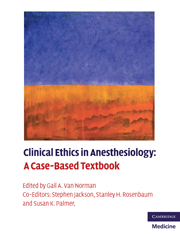Book contents
- Clinical Ethics in Anesthesiology
- Clinical Ethics in Anesthesiology
- Copyright page
- Dedication
- Contents
- Contributors
- Foreword
- Preface
- 1 Consent and refusal
- 2 End-of-life issues
- 15 The principle of double effect in palliative care: euthanasia by another name?
- 16 Surgical interventions near the end of life: “therapeutic trials”
- 17 Withholding and withdrawing life support in the intensive care unit
- 18 Discontinuing pacemakers, ventricular assist devices, and implanted cardioverter-defibrillators in end-of-life care
- 19 Brain death
- 20 Ethical issues in organ donation after cardiac death
- 21 Revising the Uniform Anatomical Gift Act – the role of physicians in shaping legislation
- 22 Physician aid-in-dying and euthanasia
- 3 Pain management
- 4 Research and publication
- 5 Practice issues
- 6 Anesthesiologists, the state, and society
- Index
20 - Ethical issues in organ donation after cardiac death
from 2 - End-of-life issues
Published online by Cambridge University Press: 05 March 2012
- Clinical Ethics in Anesthesiology
- Clinical Ethics in Anesthesiology
- Copyright page
- Dedication
- Contents
- Contributors
- Foreword
- Preface
- 1 Consent and refusal
- 2 End-of-life issues
- 15 The principle of double effect in palliative care: euthanasia by another name?
- 16 Surgical interventions near the end of life: “therapeutic trials”
- 17 Withholding and withdrawing life support in the intensive care unit
- 18 Discontinuing pacemakers, ventricular assist devices, and implanted cardioverter-defibrillators in end-of-life care
- 19 Brain death
- 20 Ethical issues in organ donation after cardiac death
- 21 Revising the Uniform Anatomical Gift Act – the role of physicians in shaping legislation
- 22 Physician aid-in-dying and euthanasia
- 3 Pain management
- 4 Research and publication
- 5 Practice issues
- 6 Anesthesiologists, the state, and society
- Index
Summary
Keywords
- Type
- Chapter
- Information
- Clinical Ethics in AnesthesiologyA Case-Based Textbook, pp. 114 - 122Publisher: Cambridge University PressPrint publication year: 2010

